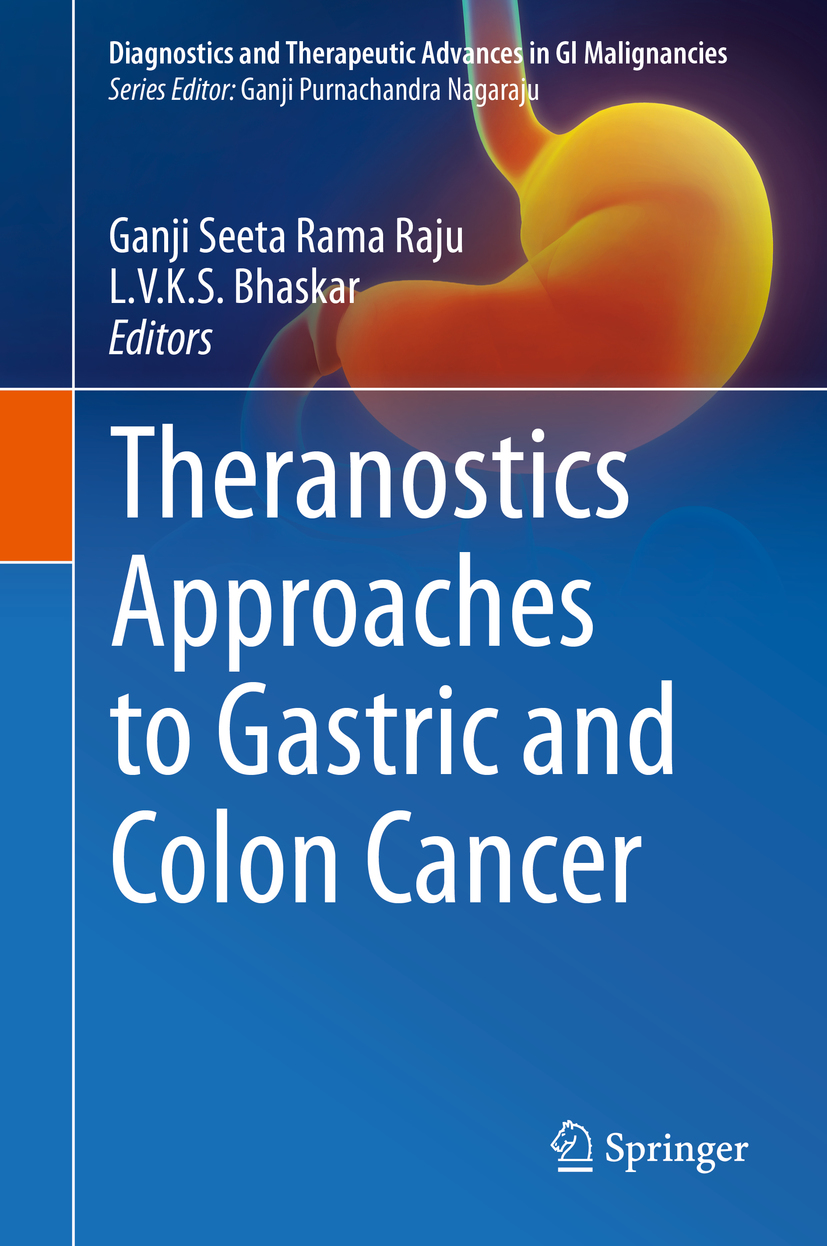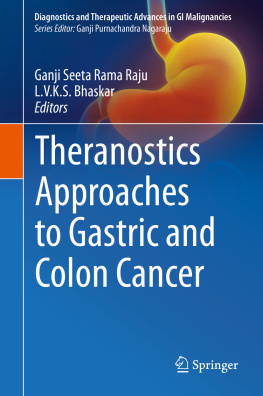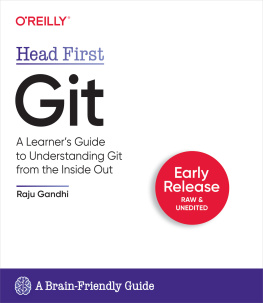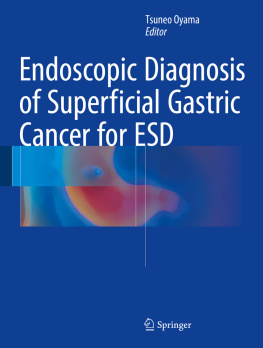Ganji Seeta Rama Raju - Theranostics Approaches to Gastric and Colon Cancer
Here you can read online Ganji Seeta Rama Raju - Theranostics Approaches to Gastric and Colon Cancer full text of the book (entire story) in english for free. Download pdf and epub, get meaning, cover and reviews about this ebook. year: 2020, publisher: Springer Singapore, genre: Home and family. Description of the work, (preface) as well as reviews are available. Best literature library LitArk.com created for fans of good reading and offers a wide selection of genres:
Romance novel
Science fiction
Adventure
Detective
Science
History
Home and family
Prose
Art
Politics
Computer
Non-fiction
Religion
Business
Children
Humor
Choose a favorite category and find really read worthwhile books. Enjoy immersion in the world of imagination, feel the emotions of the characters or learn something new for yourself, make an fascinating discovery.
- Book:Theranostics Approaches to Gastric and Colon Cancer
- Author:
- Publisher:Springer Singapore
- Genre:
- Year:2020
- Rating:3 / 5
- Favourites:Add to favourites
- Your mark:
- 60
- 1
- 2
- 3
- 4
- 5
Theranostics Approaches to Gastric and Colon Cancer: summary, description and annotation
We offer to read an annotation, description, summary or preface (depends on what the author of the book "Theranostics Approaches to Gastric and Colon Cancer" wrote himself). If you haven't found the necessary information about the book — write in the comments, we will try to find it.
Theranostics Approaches to Gastric and Colon Cancer — read online for free the complete book (whole text) full work
Below is the text of the book, divided by pages. System saving the place of the last page read, allows you to conveniently read the book "Theranostics Approaches to Gastric and Colon Cancer" online for free, without having to search again every time where you left off. Put a bookmark, and you can go to the page where you finished reading at any time.
Font size:
Interval:
Bookmark:

This series will highlight the recent innovations in the diagnostics and therapeutic strategies for different Gastrointestinal (GI) cancers.
Gastrointestinal cancers are a group of cancers that affect the digestive system and include gastric cancer, colorectal cancer, liver cancer, esophageal cancer, and pancreatic cancer. GI cancers are the leading health problem in the world and their burden is increasing in many countries. This heavy burden is due to the lack of effective early detection methods and to the emergence of chemoradioresistance. Attempts at improving the outcome of GI cancers by incorporating cytotoxic agents such as chemo drugs have been so far disappointing. These results indicate that the main challenge remains in the primary resistance of GI cancer cells to chemotherapy in the majority of patients. Therefore, improvement in the outcomes of these malignancies is dependent on the introduction of new agents that can modulate the intrinsic and acquired mechanisms of resistance.
The increased understanding of the biology, metabolism, genetic, epigenetic, and molecular pathways dysregulated in GI cancers has revealed the complexity of the mechanisms implicated in tumor development. These include alterations in the expression of key oncogenic or tumor suppressive miRNAs, modifications in methylation patterns, the upregulation of key oncogenic kinases, etc.
The individual books in this series will focus on the genetic basis of each gastrointestinal cancers, molecular pathophysiology, and different biomarkers to estimate cancer risk, detection of cancer at microscopic dimensions, and suitable and effectiveness of the therapies. In addition, the volumes will discuss the role of various signaling molecules/pathways and transcriptional factors in the regulation of the tumor microenvironment and effect on the tumor growth.
Lastly, it will elaborate the use of molecularly targeted drugs that have been proven to be effective for the treatment of GI cancers, with a focus on the emerging strategies.
This edition will provide researchers and physicians with novel ideas and perspectives for future research that translates the bench to the bedside.
More information about this series at http://www.springer.com/series/16343

This Springer imprint is published by the registered company Springer Nature Singapore Pte Ltd.
The registered company address is: 152 Beach Road, #21-01/04 Gateway East, Singapore 189721, Singapore
This book is dedicated to our families, our teachers, and friends.
Gastrointestinal malignancies are one of the most common tumors encountered worldwide. The tumor occurs in the small intestine and becomes symptomatic only when it is stabilized and attains a certain size. Among the gastrointestinal malignancies, colorectal cancer and gastric cancer are the most frequently diagnosed tumors. Colorectal cancer remains the deadliest neoplastic disease and diagnosed annually as the third most common disease in both men and women in the USA, whereas gastric cancer is the second deadly type of neoplasia worldwide that is the leading cause of cancer-related mortality. Despite the availability of various modern advanced therapies, the prognosis rate for cancer is still unsatisfactory and mortality rates remain high. Thus, there is an urgent need for the detection of biomarkers and improvement in the effectiveness of the therapy at the molecular level in order to appropriately target and diagnose the disease at its early stages. Chemotherapy remains the only therapy for cancer; however, the resistance developed by tumor cells against current chemo drugs is a major hurdle. Additionally, the metastatic recurrence after resection is also a major cause of death in patients. Therefore, understanding the underlying mechanism and factors involved in the development of metastasis is crucial and would help in determining specific targets for therapy. Neoadjuvant therapies effectively stifle the evolution of drug resistance and recurrence. Moreover, the use of phytochemicals along with chemodrugs and immunotherapies could support the development of new strategies for cancer therapy. This can be further strengthened by the support of nanotechnology to potentiate target therapy. Thus, many more novel strategies should be developed, which specifically focus on reprogramming immune cells and their pathways to sensitize tumor cells against the drugs used.
The preface illustrates a clear understanding about the molecular mechanism of chemoresistance and helps in designing new drugs, therapeutic strategies, and stronger drug delivery mechanisms in cancer. This books focus is on novel theragnostic approaches. Theragnostics is a field of science that combines diagnosis and specific targeted therapies. This field also involves nanotechnology to unite the diagnostic and therapeutic application and further uses specific molecular pathways to acquire diagnostic images and targeted therapy for drug delivery. In this book, we have also evaluated and examined the crucial proteins and their signalling pathways involved in carcinogenesis. This book contains 13 chapters that elaborately discuss the biology and signaling pathways of various proteins involved in both colorectal and gastric cancer progression. Additionally, we also examine the therapeutic role of phytochemicals and evaluate the efficacy of phytochemicals, such as resveratrol, curcumin, and quercetin, for their clinical significance as strong anticancer drugs that can sensitize tumor cells. Immunotherapy and nanotechnology are explored in various ways for targeted therapy, drug delivery, and efficacy of drug at the target site. To further confirm the correlation between colorectal cancer susceptibility and alcohol metabolizing and detoxification, gene polymorphisms from previously published association studies were examined in meta-analysis.
Font size:
Interval:
Bookmark:
Similar books «Theranostics Approaches to Gastric and Colon Cancer»
Look at similar books to Theranostics Approaches to Gastric and Colon Cancer. We have selected literature similar in name and meaning in the hope of providing readers with more options to find new, interesting, not yet read works.
Discussion, reviews of the book Theranostics Approaches to Gastric and Colon Cancer and just readers' own opinions. Leave your comments, write what you think about the work, its meaning or the main characters. Specify what exactly you liked and what you didn't like, and why you think so.











